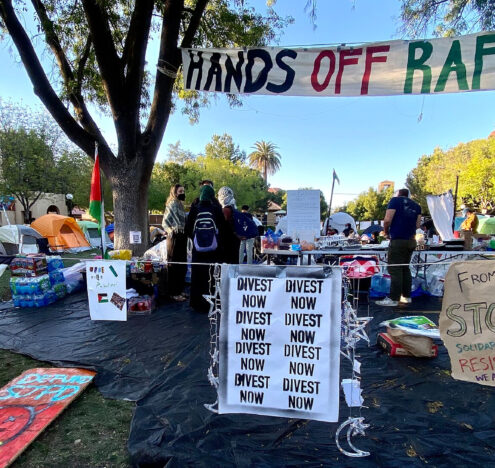“Adults in a Room” is a series in collaboration with The Stimson Center’s Reimagining US Grand Strategy program. The series stems from the group’s monthly networking events that call on analysts to gather virtually and hash out a salient topic. It aims to give you a peek into their Zoom room and a deep understanding of the issue at hand in less than the time it takes to sip your morning coffee without the jargon, acronyms, and stuffiness that often come with expertise.
In the immediate aftermath of the Oct. 7 attacks by Hamas against Israel, there was alarm by many around the world that the ensuing war would spread into a larger regional conflict, which the United States would be drawn into. That possibility remains significant, but in some ways overshadows the more immediate regional and global implications of the Israel-Gaza war for US policy now and in the future. Whether it is providing billions of dollars in military aid to Israel, offering humanitarian support for the millions affected by the war, or seeking to mitigate regional animosity that disrupts global trade and threatens to escalate into a broader war, the United States is deeply bound to the conflict.
Last November’s Reimagining US Grand Strategy roundtable brought members of the foreign policy community together to examine the role of the United States in the conflict and what direction it might go. There was widespread agreement that the Biden administration has tied itself to the approach of the Netanyahu government, allowing Israel broad authority to execute its war in Gaza and serving as a diplomatic shield to Israel at the international level. There were many in the group who raised alarm at the potential for an escalation in the region to a broader war that would result in the United States in direct conflict with Iran. Three of the attendees of the roundtable provided updated analysis of the role of the global implications of the conflict and thoughts about what it means for the role of the United States in the world.
Amy Hawthorne, Independent Expert on Middle East politics and US foreign policy
Because the Israel-Gaza war and the dynamics it has unleashed are so complex, as an analyst I feel humble right now about drawing firm conclusions or making predictions. Instead, I have been asking myself questions as a way of thinking through what is happening and what may happen. So below are seven questions that are on my mind.
First, what are the circumstances related to the Gaza war that could lead the United States into a direct military confrontation with Iran? Is the US government doing everything it can to prevent that from happening?
Second, with Israel having cast this war in absolutely existential terms, and the United States having tied itself so tightly to Israel’s war effort, what would it mean for the United States if Israel loses? As Jon Alterman wrote in November:
“Most discussions about the war in Gaza assume that, in the end, Israel will win. The stakes are so high for Israel, and Israel’s edge over Hamas is so large, that any outcome other than victory is unthinkable. The only questions are in what timeframe and at what cost.
And yet it is quite possible that the war in Gaza will be the first war in Israel’s history that the army has fought and lost. That loss would be catastrophic for Israel and deeply damaging to the United States. Precisely because of that, it must be considered.”
Third, what will a decimated, traumatized, and shrunken Gaza mean for Gazans, for the West Bank, for Israel, for Egypt, for the rest of the Arab countries, for the international community? This region has seen more than its share of destruction, but it hasn’t seen something quite like what Gaza has become as a result of this war. Beyond the shocking scale of its physical ruination of the enclave, Israel has killed Palestinians, Oxfam says, at a higher daily rate than has occurred in any major recent conflict. Beyond the horrifying death toll, rights groups say that more than 60,000 Gazans are wounded and tens of thousands more are missing. There are major questions not only about who will govern Gaza post-Hamas, but also about what will be the nature of the polity and society to be governed. And of course, the level of trauma in Israel post-Oct. 7 compounds the complexity of the situation.
Fourth, what would it mean to have Hamas emerge from this war as an insurgent movement in Gaza? Even if Israel manages to weaken Hamas significantly, the group will retain a presence and support inside Gaza. Crucially, it also will draw external support from the West Bank, from Iran, and perhaps via Sinai (though Egypt will do everything to prevent this). Moreover, Hamas could emerge from this war with increased backing from Palestinians and greater regional stature. There are all the ingredients for Hamas to become an entrenched insurgent movement, one that is hard to defeat.
Fifth, what would a full-scale West Bank uprising look like, in this post-Oct. 7 Israeli political landscape, and with the current Palestinian leadership and array of regional actors? Much has profoundly changed since the last Intifada. The West Bank today has a significantly different political and physical terrain, nor are the region and the world the same as 20 years ago.
Sixth, as the Biden administration has now committed itself to pursuing a two-state solution to this conflict, who are the actual partners in Israel and on the Palestinian side for that project after the Oct. 7 attacks? And what is the United States going to do differently this time, considering its record of failure in this peacemaking realm?
Finally, how will this war affect politics and society here in the United States? The past three months have seen mass protests, sharp increases in antisemitism and islamophobia, constraints on free speech, and a split in the Democratic party. This war quickly became part of our own bitter culture wars and ugly partisan fights. Will the conflict continue to attract Americans’ attention and deepen rancor as we enter an especially tense election season?
James Siebens, Fellow, Stimson Center’s Reimagining US Grand Strategy Program
In anticipation of Israel’s ground invasion of Gaza in October, a number of militant groups in the region issued statements warning that they might be willing to intervene in the conflict if Hamas was on the verge of defeat. Less than a month into the war, on Oct. 28, Iran’s President Ebrahim Raisi publicly stated that the “Zionist regime’s crimes have crossed the red lines, which may force everyone to take action. Washington asks us to not do anything, but they keep giving widespread support to Israel. The US sent messages to the Axis of Resistance but received a clear response on the battlefield.” However, the purported “red lines” issued by various militant groups were so vague and open ended that it is nearly impossible to assess what actions might “cross the line,” or to evaluate the danger or consequences of doing so. Vague red lines and unclear threats do not make for effective deterrence, and may unfortunately represent a perfect recipe for escalation.
Israel was obviously not deterred from entering Gaza by the initial threats of intervention made by outside groups like Hezbollah, and it has continued intense combat operations and bombing in Gaza, exacting a terrible toll on both Hamas and the civilian population. The US has also faced increasing political and military pressure across the region. Whatever Israel’s military goals and interests in Gaza may be, the costs of the ongoing regional escalation resulting from the conflict will continue to be borne by the United States.
American military forces across the region have already been subjected to a variety of attacks in retaliation for Israel’s actions in Gaza. US troops in Iraq and Syria have reportedly “come under attack from Iran-backed militias 130 times since Oct. 17, according to the Pentagon’s tally” as of January 18. Though thankfully no American service members have yet been killed in these attacks, more than 60 have been injured. On Nov. 13, a senior US defense official was quoted claiming, “We hold Iran accountable for these attacks, not just the militia groups.” Later, Kataib Hezbollah announced that it is considering “expanding the scope of targets” if the US military continues with its strikes, warning that attacks “will not go unpunished.” The United States has carried out at least seven retaliatory strikes against Iran-backed militias in response to these rocket and drone strikes.
Since mid-November, Houthi militants in Yemen have launched at least 27 attacks targeting civilian commercial shipping in the Red Sea. Houthi leadership has attempted to publicly justify these attacks as “performing their religious, moral and humanitarian duty in support and aid of those who have been wronged in Palestine and Gaza.” They also stated that any vessels bound for Israel “will become a legitimate target for [Houthi] armed forces.” These statements indicate that the Houthis are disrupting international shipping specifically to apply coercive pressure on Israel and its supporters to compel them to end the war in Gaza.
In response to the Houthis’ attacks, the US Navy has shot down numerous drones, which The New York Times reported may “signal another escalation in the tit-for-tat attacks between the American military and Iranian-backed militants.” In an effort to defend international commercial shipping and deter future attacks by the Houthis, the US has organized an international task force, Operation Prosperity Garden, which has since destroyed numerous Houthi attack drones, sunk three Houthi attack boats, and struck multiple anti-ship missiles and other targets inside Yemen. While the US-led coalition response has degraded the Houthis’ ability to launch such attacks, Biden has admitted that it has not deterred future attacks. The Houthis have succeeded in causing costly disruptions to international commerce, with at least 90% of container vessels rerouting around the continent of Africa to avoid the danger in the Red Sea. What’s worse, the Biden administration has utterly failed to meaningfully address the root motivation for these attacks — the ongoing assault on Gaza.
It remains unclear whether the current level of outside attacks constitutes the full measure of coercive pressure that regional militant groups are willing to apply, or what exactly might trigger further escalation or expansion of the war. However, it’s clear at this point that neither side has been deterred from taking actions viewed as unacceptable by the other, and that the result has been steady, ongoing escalation of tit-for-tat punishment. The so-called “axis of resistance” is attempting to compel an end to the war in Gaza, and the US is attempting to simultaneously deter attacks on its forces in the region, and on international shipping, and on Israel, ostensibly to prevent the further expansion of the war. Unfortunately, deterrence is failing.
Since October, Israel has consistently pressed the conflict in the opposite direction, teasing the potential for an expanded war and effectively drawing more attacks on US forces and international commercial traffic. It has conducted numerous airstrikes against Syria and Lebanon in recent months, including targeting journalists and the Lebanese military. More recently, a string of assassinations widely attributed to Israel, including an Iranian Revolutionary Guard commander in Damascus, a high-ranking Hamas leader in Beirut, and a senior Hezbollah commander in southern Lebanon — coupled with the recent US airstrike on the headquarters of the Iraqi Popular Mobilization Force in Baghdad — all seem virtually guaranteed to provoke more violent responses from multiple third countries. As a result of these attacks, the leaders of Hezbollah and Iran have vowed revenge, and the Prime Minister of Iraq has started exploring the eviction of US forces from the country. Such retaliation could increase the threat to US forces and would likely draw the US into a greater conflagration.
Clearly the war in Gaza is divisive at home and deleterious to US interests in the region, not to mention its claim to global leadership.
James Siebens
Israel’s response to Hamas’ brutal massacre initially had widespread public support in the US, but public opinion has since begun to sour. As early as November, Ipsos polling already found that while most respondents believe Israel’s response to the Oct. 7 terrorist attack was understandable, half believe it has been excessive, and clear majorities — regardless of party affiliation — also believe that Israel should avoid further killing of civilians in its strikes against Hamas, and that it should declare a ceasefire, enter negotiations, and allow humanitarian aid to reach Palestinian civilians. A clear bipartisan majority also believed that “American diplomats should actively be working on a plan to allow civilians fleeing fighting in Gaza to find safe haven in the southern part of the Gaza Strip.” At the same time, close US partners in Jordan and Egypt have jointly called for a ceasefire in Gaza, and Saudi Arabia has called on the US to exercise restraint in its responses to Houthi attacks that were made in solidarity with the Palestinians. Clearly the war in Gaza is divisive at home and deleterious to US interests in the region, not to mention its claim to global leadership.
Most calls for a ceasefire in Gaza have thus far focused on the humanitarian disaster created by the “indiscriminate bombing” of civilian areas — resulting in the damage or destruction of most buildings and homes in Gaza — as well as the use of siege tactics and the forced displacement of 1.9 million people, all arguably in violation of international humanitarian law. However, for those unmoved by the human suffering that has already occurred, or by the ongoing offensive in southern Gaza, consider this: the US is in real danger of being dragged into another major conflict in the Middle East, this time clearly against the will of the American people, against the better judgment of its leaders, and against all intelligible national interests.
The US has a moral and strategic imperative to defend its forces in the field, and to deter such attacks if at all possible. It also has a strong interest in protecting international commerce, and an abiding interest in preventing further escalation and expansion of the war. However, the Biden administration must realize that these risks remain explicitly and inextricably linked to Israel’s conduct in Gaza. Further, domestic polling and the UN General Assembly both indicate that President Biden has a strong political mandate to pressure Israel to end the war. It is debatable whether or not Israel’s leaders are choosing a course that is in the best interests of their people and Israel’s long-term security — or if there are other motivations for deliberately prolonging or expanding the war. However, there is no debate as to whether a wider war in the Middle East is in the best interest of the American people.
Responsible American statecraft should prioritize US national interests and national security, and should never permit the actions of other countries, even close allies, to dictate the course of US policy — especially in matters of war and peace. It is time for President Biden to give Prime Minister Netanyahu another “bear hug,” but this time he needs to squeeze harder in the interests of the United States, and indeed the world.
Emma Ashford, Senior Fellow, Stimson Center’s Reimagining US Grand Strategy Program
The Biden administration’s strong showing of support for the government of Israel in the aftermath of the horrific Oct. 7 Hamas attacks was eminently understandable. Biden himself made a trip to the country, spoke with survivors of the attacks, and encouraged US officials to engage with their Israeli counterparts on the plans for Israeli retaliation. The US and Israel have long been partners — though perhaps not always as unconditionally as some might suggest — and this response, in many ways, seemed like the only appropriate response to such a harrowing attack.
At the same time, even early on in this process, it was apparent that unqualified support for Israel in its reprisals against Hamas carried risks. It might contribute to the notion that America had abandoned her commitment to a two-state solution in the Israel-Palestine conflict. And it was particularly worrying that the Israeli government did not seem to have a post-conflict plan, building its campaign instead around punitive strikes. The administration was clearly worried about these risks in autumn 2023, and that concern only grew as humanitarian concerns escalated in the early weeks of the conflict. But aside from a few private conversations, the White House has largely stood behind the Israeli campaign, and has continued to facilitate arms transfers and other forms of support.
It is hard to envisage any plausible scenario that could produce a good outcome for US interests in the aftermath of this war.
Emma Ashford
The results have been bleak. Israel has no doubt significantly degraded Hamas’s capacity to wage future terror attacks. But the cost of doing so has been the death of at least 24,000 Palestinians, the destruction of much of the Gaza Strip, and the forcible internal displacement of much of the population, and an uncertain future for the residents of Gaza, who cannot return to anything approaching a normal life. The attention of US policymakers has been tied up with this conflict for months, and the US has been forced to send significant naval deployments to protect shipping in and around the Red Sea. The risk of regional war remains high. The United States also faces criticism internationally from both allies and adversaries, arguing that it is complicit in Israeli actions.
In short, although the initial impetus for Biden’s full-throated support was reasonable, the administration’s failure to think ahead and consider the problems that would almost inevitably emerge doomed their approach from the start. Today, it is hard to envisage any plausible scenario that could produce a good outcome for US interests in the aftermath of this war.





















